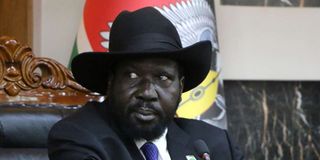South Sudan: Peace monitors warn Juba is running out of time

South Sudan President Salva Kiir attends a press conference on February 15, 2020 in Juba.
South Sudan’s peace monitors are warning that the country is running out of time to make key reforms needed to avoid war in future.
The country is marking the third anniversary since various factions signed a peace deal with President Salva Kiir’s government, and cleared the way for the formation of a government of national unity.
But the Revitalised Joint Monitoring and Evaluation Commission (RJMEC) has warned that there is little time left to meet all the goals mentioned in the deal that was meant to ensure stability.
“There is a sense of frustration prevalent among the people of South Sudan due to the slow pace of implementation of the agreement. As victims of the protracted conflict, the people of South Sudan deserve better, and must enjoy sustainable peace and development,” said Maj-Gen Charles Tai Gituai, RJMEC interim chairperson.
“At the time of this anniversary, we are roughly halfway through the Transitional period, so we see this crucial task is much delayed,” he said in a statement to mark the third year since the agreement was signed.
RJMEC, an organ of regional bloc Intergovernmental Authority on Development (Igad), is responsible for monitoring and overseeing the agreement known as the Revitalised Agreement on the Resolution of the Conflict in South Sudan (R-ARCSS).
Signed on September 12, 2018 in Addis Ababa, Ethiopia, it involved President Kiir, his nemesis Riek Machar and several rebel groups.
RJMEC is supposed to monitor respect for the agreed timelines and implementation schedule and reports to the Igad Summit. So far, the commission says, crucial targets have been missed, raising the risk of a relapse to conflict.
“I agree that the R-ARCSS is the blueprint for the stable and prosperous South Sudan... But words aside, much remains to be done in a very practical sense, and many fundamental building blocks are yet to be put in place across all chapters of the Agreement,” the R-JMEC said.
South Sudan, on February 12, 2020, formed the Transitional Government of National Unity including most of the participants in the agreement.
But it took several months before the government appointed governors for the 10 regional states. It was only just until last month that the Transitional National Legislative Assembly, the law-making body in this period, was sworn in.
The Assembly, and the Council of States, are supposed to pass several laws, within the 30 months from the day the government was created last year, such as on security, constitutional amendment, election laws, and the fight against corruption, as well as public finance.
But the country faces an immediate problem: bringing to calm various rebel groups that did not sign the agreement.
Recently, talks under what is known as the Rome Corridor, sponsored by the Catholic Church, have appeared broken as President Kiir’s side failed to send delegates.
Those talks in the Vatican should have helped convince groups that continue to make ambushes in South Sudan, to sign the agreement.
Maj-Gen Gituai said South Sudan may never enjoy peace as long as some groups remain outside the peace framework.
The country now must race against time to reform the security agencies, including the merger of various fighters that have since rejoined the government, into a national professional army.
The country was supposed to first retrain the fighters, but the programme has almost stalled. There were reports of soldiers fleeing training camps for lack of food, while others had been imposing illegal roadblocks to extort travellers.
But even after those soldiers graduated, the various parties to the agreement must also agree on the command structure to take before the merger can happen.




